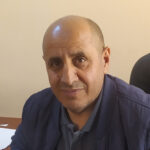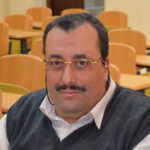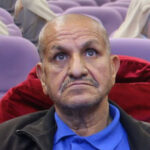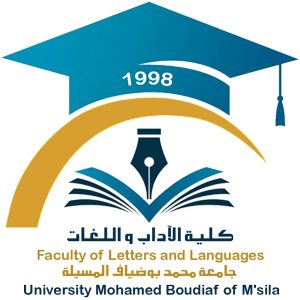
Director Laboratory of Theoretical and Applied Linguistic Studies
- P. salah ghilous
- salah.ghilous@univ-msila.dz
Introduction to the laboratory
By virtue of strong determination and scientific credibility, characteristic of the Laboratory of Theoretical and Applied Linguistic Studies, scientific activities are poised for significant advancement across all levels associated with the research teams and their members, comprising four teams.
Despite the initial challenges faced by research members, such as limited equipment, the laboratory members harbor great aspirations for the success of their research endeavors.
Furthermore, thanks to the abundant scientific output generated by academics, our laboratory aims to be a source of inspiration for numerous research students not only within the University of M’Sila but also across various national universities and research centers.
Our laboratory strives to uphold scientific rigor as a benchmark for its work, fostering academic researchers at various linguistic and linguistic levels. It aims to welcome, God willing, master’s and doctoral students in linguistic specialization in the near future, with high hopes pinned on the laboratory’s activities to realize the dreams of researchers and scholars.

Director Laboratory of Algerian Poetry
- P. fethi boukhalfa
- fethi.boukhalfa@univ-msila.dz
Introduction to the laboratory
The laboratory, accredited in the June 2003 regular session, undertakes the commitment to focus on the artistic and aesthetic specifics of modern Algerian literature in both poetry and prose (narrative). Since its inception, it has aimed to enrich Algerian and Arab literary criticism with new academic studies within the specialization of modern literary criticism. These studies include individual articles in peer-reviewed academic journals, both national and international, as well as cultural journals and published books. Over the years, its members have been distinguished by their publications and continuous scholarly efforts.
Consequently, the laboratory has defined a set of primary objectives that it continually strives to achieve:
- Conduct specialized studies within modern poetic theory in modern Algerian literature, in both poetry and prose.
- Approach the establishment of a critical theory stemming from modern poetic studies.
- Historize poetic studies in modern Algerian and Arab criticism.
- Study the aesthetic characteristics of heritage presence in creative forms within modern Algerian literature.
- Engage with poetic and critical studies in other foreign literatures, especially those written in French.
- Organize scholarly events (conferences, seminars, study days) on poetic themes and manifestations in modern Algerian literature.
- Develop a methodological vision for studying modern Algerian literature in all its written languages.
- Publish scientific works by laboratory members, including books that fall within its scientific activities.
- Reissue the Algerian Poetry Notebooks journal to meet the researchers’ desire to publish their scientific works (academic articles) in a peer-reviewed and regular manner.

Director Laboratory of Semiology in Theater Between Theory and Application
- P. lamri boutabaa
- lamri.boutabaa@univ-msila.dz
Introduction to the laboratory
The topic of “Semiotics of Theater Between Theory and Application” assumes great importance, especially for critics interested in literary and artistic studies. This symposium aims to focus on semiotics as a theory, thought, and methodology that has garnered attention from various contemporary critics worldwide across literary and linguistic specializations. It is considered part of modern curricula and has gained favor among those interested in theatrical arts, as it offers more responsiveness and harmony, addressing both the dramatic theoretical aspects and the stage-oriented production techniques which traditional curricula often neglect.
Given that theater is inherently a spectacle art, evolving from ancient Greek times to the present day, modern methodologies, particularly semiotics, are deemed most suitable for its study and deep exploration. Thus, our laboratory, named “Semiotics of Theater Between Theory and Application,” will dedicate itself to studying, critiquing, and analyzing various Algerian theatrical works, aiming to contribute, even in a small way, to the enhancement of critical discourse on theater. It also aims to guide the interests of critics interested in these methodologies, including semiotics, whether in our university or in various national artistic institutes and universities.
Key objectives of research and technological development can be highlighted as follows:
- Applying modern methodologies, including semiotics, to various studied theatrical works.
- Defining technical mechanisms for various modern critical methodologies in studying diverse theatrical works.
- Analyzing and categorizing various Algerian and non-Algerian theatrical works within a critical perspective based on modern methodologies.
- Studying and determining the relationship between dramatic text and theatrical performance.
- Enriching and diversifying modern critical studies within the field of Algerian theatrical criticism, specifically, and globally.
- Deepening critical and scholarly discourse, particularly in modern Algerian and Arab theater, across its cultural, civilizational, and artistic dimensions, reflecting the sentiments and feelings of the Algerian nation and the broader Arab world.
- Emphasizing the close relationship, through modern critical studies including semiotics, between popular Algerian theatrical tradition and societal mentality.
- Exploring the extent to which modern Algerian theater employs heritage in all its forms.
- Encouraging our students to apply modern methodologies, including semiotics, to elevate Algerian theatrical criticism to its deserved status.
- Fostering serious scholarly discussion among specialists and researchers in the field of semiotic theatrical methodologies, acknowledged as optimal by experts for studying and evaluating theatrical works.
- Assessing the strengths and weaknesses of this methodology in theatrical studies to leverage its strengths and mitigate its weaknesses.
- Promoting the staging of theatrical productions for entertainment and awareness purposes.

